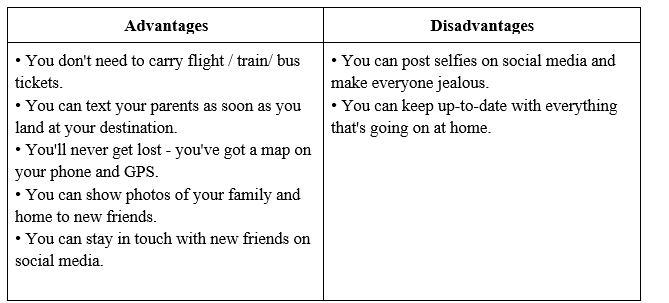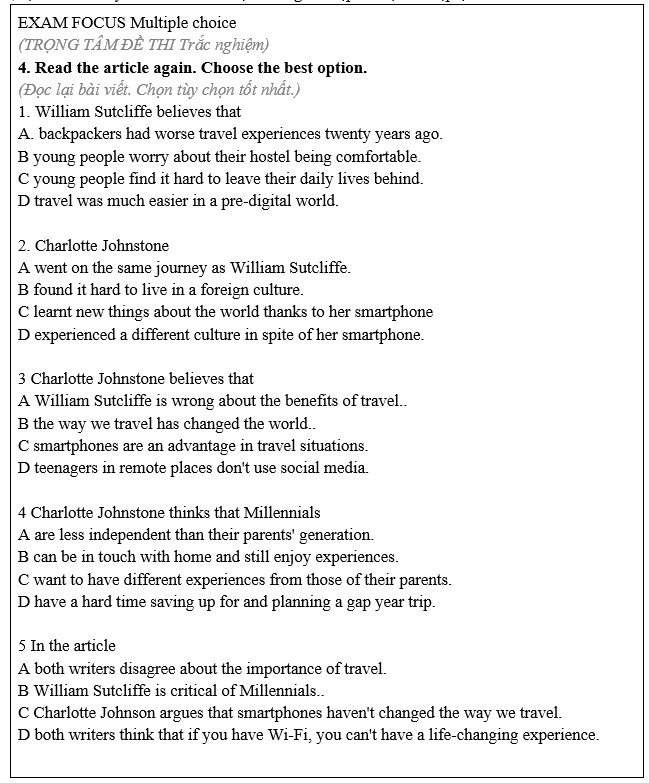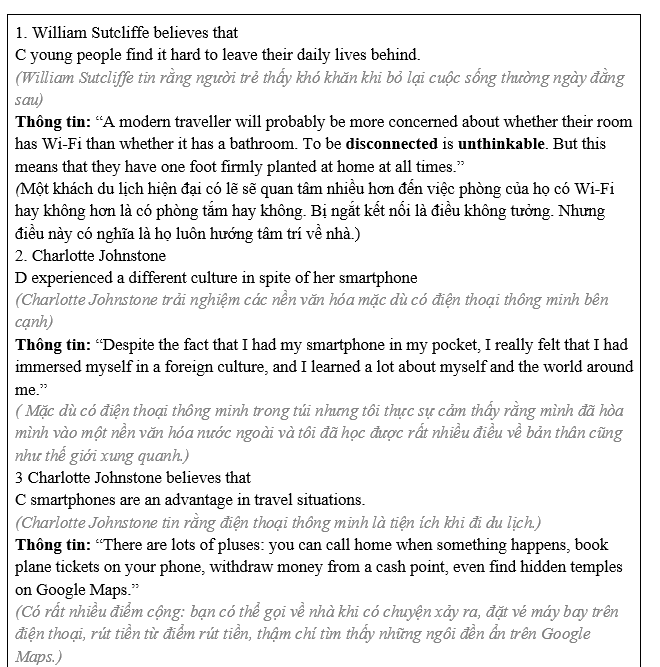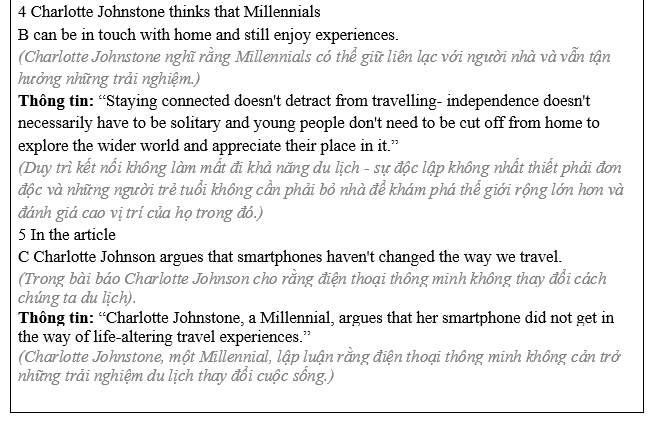Tiếng Anh 11 Unit 6 6.4 Reading1. Imagine you are going on a journey alone to a distant location. Write A for advantages and D for disadvantages of travelling with a smartphone. 2. Look at the blue words in the article on page 69. What do these words mean? 3. Read the article. Which of the reasons for travelling in Exercise 1 is mentioned? 4. Read the article again. Choose the best option. GÓP Ý HAY - NHẬN NGAY QUÀ CHẤT Gửi góp ý cho HocTot.Nam.Name.Vn và nhận về những phần quà hấp dẫn
Lựa chọn câu để xem lời giải nhanh hơn
Bài 1 Multiple choice (Trắc nghiệm) I can identify the key information in an extended article. (Tôi có thể xác định thông tin chính trong một bài viết mở rộng.) 1. Imagine you are going on a journey alone to a distant location. Write A for advantages and D for disadvantages of travelling with a smartphone. (Hãy tưởng tượng bạn đang thực hiện một cuộc hành trình một mình đến một địa điểm xa xôi. Viết A cho lợi ích và D cho bất lợi khi đi du lịch với điện thoại thông minh.) • You don't need to carry flight / train/ bus tickets. (Bạn không cần mang theo vé máy bay/tàu hỏa/xe buýt.) • You can text your parents as soon as you land at your destination. (Bạn có thể nhắn tin cho bố mẹ ngay khi bạn hạ cánh xuống điểm đến.) • You'll never get lost - you've got a map on your phone and GPS. (Bạn sẽ không bao giờ bị lạc - bạn đã có bản đồ trên điện thoại và GPS.) • You can post selfies on social media and make everyone jealous. (Bạn có thể đăng ảnh selfie lên mạng xã hội và khiến mọi người ghen tị.) • You can show photos of your family and home to new friends. (Bạn có thể cho những người bạn mới xem ảnh gia đình và nhà của mình.) • You can stay in touch with new friends on social media. (Bạn có thể giữ liên lạc với những người bạn mới trên phương tiện truyền thông xã hội.) • You can keep up-to-date with everything that's going on at home. (Bạn có thể cập nhật mọi thứ đang diễn ra ở nhà.) Lời giải chi tiết:
Bài 2 2. Look at the blue words in the article on page 69. What do these words mean? (Nhìn vào những từ màu xanh trong bài viết ở trang 69. Những từ này có nghĩa là gì?) Giải nghĩa: rewarding: có tính thành tựu unavoidable: không thể tránh khỏi familiar: quen thuộc disconnected: không thể kết nối unthinkable: không thể nghĩ được Bài 3 3. Read the article. Which of the reasons for travelling in Exercise 1 is mentioned? (Đọc bài báo. Lý do nào để đi du lịch trong Bài tập 1 được đề cập?) Bài 4
Yes Charlotte Johnstone, a Millennial, argues that her smartphone did not get in the way of life-altering travel experiences. I took my gap year a couple of years ago, and I'm really glad I did, because it changed my life. The time I spent in India and Zambia were the hardest and most rewarding of my life. Despite the fact that I had my smartphone in my pocket, I really felt that I had immersed myself in a foreign culture, and I learned a lot about myself and the world around me.
Of course, the way we travel has changed; the world around us has changed. It's unavoidable. There are lots of pluses: you can call home when something happens, book plane tickets on your phone, withdraw money from a cash point, even find hidden temples on Google Maps.
Staying connected doesn't detract from travelling- independence doesn't necessarily have to be solitary and young people don't need to be cut off from home to explore the wider world and appreciate their place in it. Just as much as our parents' generation did, we Millennials want to watch the sun rise, make friends with like-minded strangers. The values and aspirations are the same. _________________ *Millennial someone born between 1980 and 2000
No Travel writer William Sutcliffe believes that smartphones have changed backpacking in a bad way. I believe that travel ought to be a profound experience. By cutting us off from everything that has previously been familiar to us, travel challenges our beliefs and makes us see the world in new ways. But when so many relationships and social support networks are carried out digitally, it's actually impossible for Millennials to cut themselves off from home. What has this done to the nature of travel?
A modern traveller will probably be more concerned about whether their room has Wi-Fi than whether it has a bathroom. To be disconnected is unthinkable. But this means that they have one foot firmly planted at home at all times. I don't think you can consider this way of travelling as a journey of self-discovery. Tạm dịch: Đúng Charlotte Johnstone, một Millennial, lập luận rằng điện thoại thông minh không cản trở những trải nghiệm du lịch thay đổi cuộc sống. Tôi đã tạm dừng việc học vài năm trước và tôi thực sự vui vì mình đã làm như vậy, vì nó đã thay đổi cuộc đời tôi. Khoảng thời gian ở Ấn Độ và Zambia là khoảng thời gian khó khăn nhất và bổ ích nhất trong cuộc đời tôi. Mặc dù có điện thoại thông minh trong túi nhưng tôi thực sự cảm thấy rằng mình đã hòa mình vào một nền văn hóa nước ngoài và tôi đã học được rất nhiều điều về bản thân cũng như thế giới xung quanh.
Tất nhiên, cách chúng ta đi du lịch đã thay đổi; thế giới xung quanh chúng ta đã thay đổi. Đó là điều không thể tránh khỏi. Có rất nhiều điểm cộng: bạn có thể gọi về nhà khi có chuyện xảy ra, đặt vé máy bay trên điện thoại, rút tiền từ điểm rút tiền, thậm chí tìm thấy những ngôi đền ẩn trên Google Maps.
Duy trì kết nối không làm mất đi khả năng du lịch - sự độc lập không nhất thiết phải đơn độc và những người trẻ tuổi không cần phải bỏ nhà để khám phá thế giới rộng lớn hơn và đánh giá cao vị trí của họ trong đó. Cũng giống như thế hệ của cha mẹ chúng ta, Millennials chúng ta muốn ngắm mặt trời mọc, kết bạn với những người lạ có cùng chí hướng. Các giá trị và khát vọng là như nhau. _________________ *Người thuộc thế hệ Millennial sinh từ năm 1980 đến 2000
KHÔNG Nhà văn du lịch William Sutcliffe tin rằng điện thoại thông minh đã thay đổi việc đi du lịch ba lô theo chiều hướng xấu. Tôi tin rằng du lịch phải là một trải nghiệm sâu sắc. Bằng cách cắt đứt chúng ta khỏi mọi thứ trước đây quen thuộc với chúng ta, du lịch thách thức niềm tin của chúng ta và khiến chúng ta nhìn thế giới theo những cách mới. Nhưng khi có quá nhiều mối quan hệ và mạng lưới xã hội kỹ thuật số hỗ trợ, Millennials thực sự không thể tách rời khỏi gia đình. Điều này đã làm gì với bản chất của du lịch?
Một khách du lịch hiện đại có lẽ sẽ quan tâm nhiều hơn đến việc phòng của họ có Wi-Fi hay không hơn là có phòng tắm hay không. Bị ngắt kết nối là điều không tưởng. Nhưng điều này có nghĩa là họ luôn hướng tâm trí về nhà. Tôi không nghĩ bạn có thể coi cách du lịch này là một hành trình khám phá bản thân. Lời giải chi tiết:
Bài 5 5(6.07) Complete the verb phrases with the words in the box. Use the underlined phrases in the article to help you. Then listen, check and repeat (Hoàn thành các cụm động từ với các từ trong hộp. Sử dụng các cụm từ được gạch chân trong bài viết để giúp bạn. Sau đó nghe, kiểm tra và lặp lại.)
cut yourself off from challenge
withdraw money from take
1. immerse yourself in a foreign culture 2. ________________ your beliefs 3. ________________ your family/home 4. ________________ a gap year 5. ________________ a cash point Lời giải chi tiết: 2. challenge your beliefs: thử thách niềm tin 3. cut yourself off from your family/home: tách bản thân khỏi gia đình 4. take a gap year: tạm dừng (việc học, việc làm) 5. withdraw money from a cash point: rút tiền từ một điểm tiền mặt Bài 6 6. In groups, discuss: Do you agree with the following statements? Give reasons and examples. (Thảo luận theo nhóm: Em có đồng ý với những nhận định sau không? Đưa ra lý do và ví dụ.) 1. If you never go abroad, you never think critically about our own opinions. (Nếu bạn không bao giờ ra nước ngoài, bạn không bao giờ suy nghĩ chín chắn về ý kiến của chính bạn. ) 2. It's impossible to stop communicating completely with home when you have unlimited access to the Internet. (Không thể ngừng liên lạc hoàn toàn với gia đình khi bạn có quyền truy cập Internet không giới hạn.) Lời giải chi tiết: I agree with these statements. 1. Going abroad helps us think critically about our own opinions. The journey will give us a fresh point of view and open our mind. We must learn to take responsibility for everything, so we will be more decisive and self- reliant. (Ra nước ngoài giúp chúng ta suy nghĩ chín chắn về ý kiến của chính mình. Chuyến đi sẽ cho chúng ta một góc nhìn mới mẻ và mở mang đầu óc. Chúng ta phải học cách chịu trách nhiệm về mọi việc, như vậy chúng ta sẽ quyết đoán và tự chủ hơn.) 2. I think we can not stop communicating completely with home when we have unlimited access to the Internet. Our family can call us whenever they want because they know the electronic device is connected to the Internet. On the contrary, we can’t stand contacting people because we always want to share new things in the journey. (Tôi nghĩ rằng chúng ta không thể ngừng giao tiếp hoàn toàn với gia đình khi chúng ta có quyền truy cập Internet không giới hạn. Gia đình chúng tôi có thể gọi cho chúng t bất cứ khi nào họ muốn vì họ biết thiết bị điện tử được kết nối với Internet. Ngược lại, chúng ta không thể ngừng liên lạc với mọi người vì chúng ta luôn muốn chia sẻ những điều mới mẻ trong hành trình.)
>> 2K9 Học trực tuyến - Định hướng luyện thi TN THPT, ĐGNL, ĐGTD ngay từ lớp 11 (Xem ngay) cùng thầy cô giáo giỏi trên Tuyensinh247.com. Bứt phá điểm 9,10 chỉ sau 3 tháng, tiếp cận sớm các kì thi.
|


























